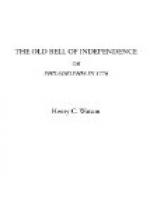“A general scene of devastation was now spread through all the townships. Fire, sword, and the other different instruments of destruction, alternately triumphed. The settlements of the tories alone generally escaped, and appeared as islands in the midst of the surrounding ruin. The merciless ravagers, having destroyed the main objects of their cruelty, directed their animosity to every part of living nature belonging to them—shooting and destroying some of their cattle, and cutting out the tongues of others, leaving them still alive to prolong their agonies.
“The following are a few of the more singular circumstances of the barbarity practised in the attack upon Wyoming. Captain Bedlock, who had been taken prisoner, being stripped naked, had his body stuck full of splinters of pine-knots, and then a heap of the same piled around him; the whole was then set on fire, and his two companions, Captains Ranson and Durgee, thrown alive into the flames and held down with pitchforks. The returned tories, who had at different times abandoned the settlement in order to join in those savage expeditions, were the most distinguished for their cruelty: in this they resembled the tories that joined the British forces. One of these Wyoming tories, whose mother had married a second husband, butchered with his own hands both her, his father-in-law, his own sisters, and their infant children. Another, who during his absence had sent home several threats against the life of his father, now not only realized them in person, but was himself, with his own hands, the exterminator of his whole family, mothers, brothers, and sisters, and mingled their blood in one common carnage with that of the aged husband and father. The broken parts and scattered relics of families, consisting mostly of women and children who had escaped to the woods during the different scenes of this devastation, suffered little less than their friends, who had perished in the ruins of their houses. Dispersed, and wandering in the forests as chance and fear directed, without provision or covering, they had a long tract of country to traverse, and many, without doubt, perished in the woods.”
“Such deeds make the blood curdle in my veins,” observed Mrs. Harmar.
“It is said that the cruelty of Colonel John Butler at Wyoming has been greatly exaggerated,” remarked Mr. Jackson Harmar. “His son, Walter Butler, was certainly a savage, and the bloody deeds he committed have been frequently attributed to his father. But I think history should set the matter right, nor found its assertions upon the stories of the exasperated whigs.”
“That’s well thought of you, Mr. Harmar, but it’s my opinion that historians cannot find any evidence of the humanity of John Butler. As I said before, I firmly believe the story of my friend. If John Butler did not butcher the men who asked for quarter, he looked quietly on while the red men did it, and therefore he is just as criminal, in my eyes, as if he had handled the tomahawk,” said Morton, emphatically.




